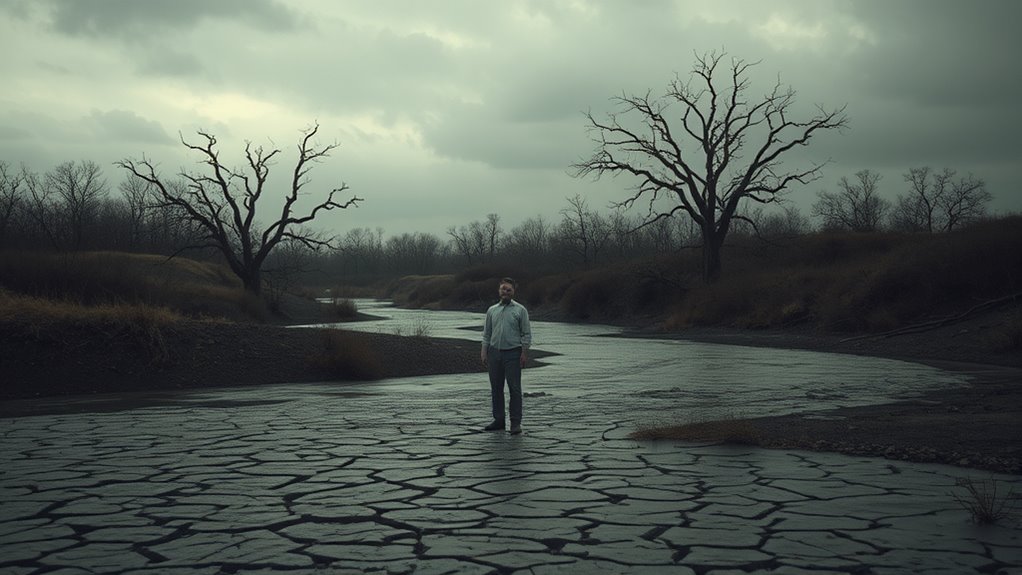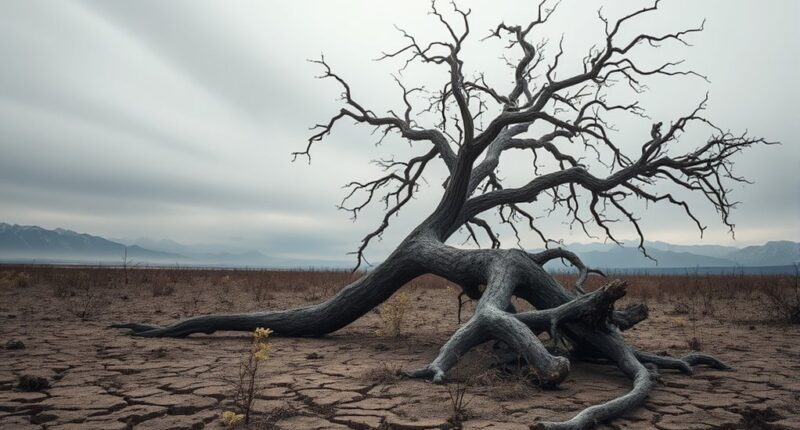Ecological grief is a natural emotional response to losing natural places, species, or childhood memories due to environmental damage. You might feel sadness, despair, or helplessness as you connect deeply with nature. To cope, engage in activities like gardening, conservation, or community efforts that restore purpose. Sharing your feelings and taking small actions can turn grief into hope. Continuing to explore ways to nurture your environmental bond can help you find resilience and meaning amid the loss.
Key Takeaways
- Recognize ecological grief as a natural emotional response to environmental loss to validate your feelings.
- Strengthen your connection to nature through outdoor activities and conservation efforts to foster resilience.
- Turn grief into action by supporting sustainable practices and participating in local environmental initiatives.
- Build a community of like-minded individuals to share experiences and reduce feelings of helplessness.
- Embrace your emotions as a catalyst for hope and meaningful change, helping you find purpose amid environmental challenges.

Ecological grief is a growing emotional response to the loss of natural environments caused by climate change, pollution, and human activity. As you become more aware of the changing world around you, you might feel an overwhelming sense of sadness or despair. This grief often stems from what’s called climate anxiety—an internal worry about the future of the planet and your place within it. It’s natural to feel this way when witnessing the decline of ecosystems, the disappearance of species, or the worsening of climate conditions. You might find yourself mourning the loss of familiar landscapes, animals, or even childhood memories connected to nature. This emotional toll can be heavy, but understanding it is the first step toward coping.
Your connection to nature plays a vital role in how you experience ecological grief. If you’ve spent time outdoors, hiked in forests, or enjoyed quiet moments by lakes, you likely feel a deep sense of loss when those places change or vanish. This bond makes the impact of environmental destruction personal, intensifying feelings of helplessness or despair. Recognizing that your emotions are valid can help you process them more effectively. It’s okay to mourn what’s been lost—doing so confirms your care for the planet. However, it’s also essential to find ways to nurture your nature connection, even amid troubling news. Engaging in activities like gardening, nature walks, or volunteering for conservation efforts can restore a sense of agency and purpose.
Many find that focusing on small, positive actions helps lessen feelings of helplessness associated with ecological grief. By actively participating in local environmental initiatives or supporting sustainable practices, you transform grief into motivation. These efforts strengthen your connection to the natural world and can alleviate climate anxiety by giving you a sense of control. Remember, you’re not powerless; your choices, no matter how small, contribute to broader change. Connecting with others who share your concerns builds a supportive community where shared grief can be expressed and understood. Talking openly about your feelings reduces isolation, making the emotional burden easier to bear.
In essence, ecological grief reflects your deep care for the planet. Embracing this emotion can propel you toward meaningful action and deeper connection with nature. By acknowledging your climate anxiety and actively nurturing your relationship with the environment, you create resilience against despair. This ongoing process helps you find hope and purpose in a world facing significant environmental challenges. Additionally, understanding the importance of contrast ratio in visual media can help deepen your appreciation for the beauty of natural scenes and the importance of preserving their integrity. Ultimately, your compassion and engagement become powerful tools to cope with loss and inspire change for a healthier planet.
Frequently Asked Questions
How Can Communities Collaboratively Address Ecological Grief?
You can foster community support by organizing local events and conversations that acknowledge ecological grief, helping others feel understood and less isolated. Encourage shared storytelling and collective actions like clean-ups or conservation projects to build resilience. By working together, your community creates a sense of purpose, healing emotional wounds, and strengthening bonds. This collective resilience empowers everyone to face environmental challenges with hope and unity.
Are There Specific Mental Health Resources for Ecological Grief?
Did you know that over 60% of people experiencing ecological grief find support helpful? Yes, there are specific mental health resources for this, like green therapy, which connects you with nature-based healing, and support groups where you share your feelings with others facing similar losses. These resources help you process grief, restore hope, and build resilience, making it easier to cope with the emotional toll of environmental loss.
How Does Ecological Grief Differ Across Cultures?
You notice that ecological grief differs across cultures because of varying cultural perceptions and grief expressions. In some societies, people openly mourn environmental loss with rituals, while others may view it as a collective responsibility or spiritual matter. These cultural differences shape how you experience and express eco-anxiety, influencing your coping strategies. Understanding these diverse perspectives helps you better navigate your feelings and find support within your cultural context.
Can Ecological Grief Motivate Positive Environmental Action?
Yes, ecological grief can motivate you to take climate activism and build emotional resilience. When you feel connected to the environment’s loss, it sparks a desire to make a difference. Your emotional resilience grows as you channel grief into positive action, inspiring change. This motivation can lead to meaningful efforts like community projects or policy advocacy, helping you cope with grief while actively protecting the natural world.
What Role Does Education Play in Healing Ecological Grief?
Education plays a essential role in healing ecological grief by fostering understanding, inspiring awareness, and encouraging action. Through educational programs and awareness campaigns, you gain knowledge about environmental issues, connect emotionally with nature, and find hope in solutions. This empowerment helps you process loss, reduces feelings of helplessness, and motivates positive change. Education transforms grief into purpose, guiding you toward a more sustainable future and nurturing a deeper bond with the natural world.
Conclusion
As you face ecological grief, remember that even Atlas once bore the weight of the world. Though the loss feels overwhelming, you’re not alone—our shared compassion and action can forge new paths forward. Like the phoenix rising from ashes, hope can emerge from despair. Embrace your feelings, connect with others, and trust that, together, we can heal the wounds of our planet and find renewal amid the sorrow.










